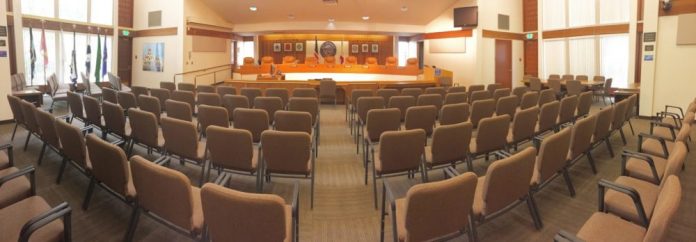The Gilroy City Council on Feb. 26 rejected a proposed resolution calling for an Israel-Gaza ceasefire.
The council’s vote followed more than an hour of public comments presented by more than 70 people in the audience who spoke passionately about whether a local resolution on the topic was appropriate. A number of local residents who spoke on either side of the debate cited personal connections to the the war that started on Oct. 7, 2023 when Hamas breached the border and killed more than 1200 people, most of them civilians, and captured more than 200 hostages, many of whom are still being held in Gaza.
Ultimately, the council voted 5-2 to reject a ceasefire resolution proposed by Councilmember Zach Hilton. Hilton and Councilmember Rebeca Armendariz were the only members who supported the motion to approve the resolution.
Some council members who voted “no” worried that a resolution calling for a ceasefire would result in more division within Gilroy, noting the tension among audience members in the room on Feb. 26.
“It is apparent this resolution is a source of strife and does not create the kind of unity and support that (we) may have hoped,” said Council member Fred Tovar.
Tovar said he received “hundreds and hundreds” of emails on the potential Israel-Hamas ceasefire resolution since it was briefly brought up at the Feb. 5 council meeting. Mayor Marie Blankley said she had received about 3,000 emails on the agenda item.
Blankley said at the end of the Feb. 26 discussion that “just the thought we were going to have this on our agenda” had created “discomfort” within the community.
Just over 70 members of the public who spoke live at the meeting were roughly evenly divided in favor of and against a ceasefire resolution. The crowd was mostly calm and considerate, though one speaker said he felt intimidated by some who had been walking through the audience holding up protest signs.
Another speaker was admonished by Blankley when he began to speak emotionally to the audience instead of the council—the only moment during the meeting when the mayor had to ask people to leave the room due to extended crowd noise. The speaker had called for Israel to be “dismantled,” in an apparent effort to incite the crowd to “be disruptive,” Blankley said afterwards.
Hilton had asked for a council vote on a ceasefire resolution after members of the public suggested it at the Feb. 5 council meeting. Hilton said Feb. 26 that the resolution he had proposed consisted of language suggested by those residents who supported a ceasefire in the conflict.
“Whereas, Gilroy supports the dignity and safety of all residents in any community in which all human life is precious and valued, and the targeting of civilians—no matter their faith or ethnicity, or country of origin—is abhorrent,” reads the proposed resolution, in part. “And whereas, over 2 million Palestinian lives in Gaza, including Israeli hostages, are at imminent risk if a permanent cease-fire is not achieved and continuous humanitarian aid is not assured.”
The Oct. 7 attack resulted in the largest death toll of Jews in a single day since the Holocaust. Subsequent offensives by the Israeli military into Gaza have led to the deaths of more than 29,000 Gazans, according to the Gaza Health Ministry.
Members of the public who spoke against the ceasefire resolution Feb. 26 largely argued that the City of Gilroy should not be involved in international affairs, and that such a decision would only lead to more division within the community. Many insisted that a resolution to the Middle East conflict should prioritize the freeing of Israeli hostages who are still being held by Hamas.
“Do you want to take a position that will alienate and traumatize the majority of the Jewish community?” said Rabbi Mendel Liberow, the Director of the South County Chabad Jewish Center. “Let’s vote for no ceasefire. Let’s get our community together and focus on bringing peace in Gilroy, and that is what will have an impact on the Middle East.”
Many who supported the resolution in Gilroy said it could help stop the ongoing deaths in Gaza and Israel, and forestall a growing humanitarian crisis in Gaza which has faced significant destruction in the conflict.
A resident who identified himself as Sal said the council should favor the resolution “in a purely humanitarian, rather than a political context.”
“It is not about antisemitism—both parties to this conflict are semitic people,” Sal said. “Being critical of government policies is not condemnation of an entire people. Many members of this community have been affected by this conflict. What’s happening is not subjective…It is very clear.”
In her comments supporting a ceasefire resolution, Armendariz agreed with audience members who referred to Israel’s offensive into Gaza as an attempted “genocide” of the Palestinian people. Armendariz was filmed at a Feb. 1 event in San Jose standing up and shouting “cease fire now” during an interrupted talk by Vice President Kamala Harris.
“We have been asked to take a stand…so the representatives at the state and congressional levels can hear us, so the voice of our residents is acted upon,” Armendariz said.















